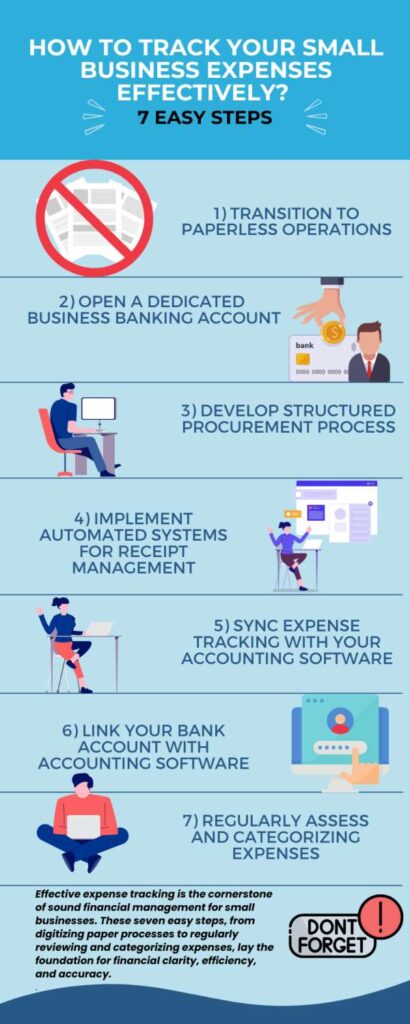
How to Track Your Small Business Expenses Effectively? (7 Easy Steps)

Many small businesses face the challenge of effectively managing their finances, a task that is both crucial and often complex. According to the insights from the Federal Reserve Small Business Credit Survey, the most prevalent financial hurdle is covering operating expenses. Alarmingly, 47% of business owners admitted they would resort to dipping into personal funds if their business revenue halted for a mere two months.
At the heart of financial management lies the practice of meticulously tracking, recording, and analyzing expenses. This isn’t just a routine task; it’s a powerful strategy that can significantly boost a business’s ability to sidestep financial pitfalls. Effective expense tracking enables a business to plan with precision, foresee potential cash flow issues, and ensure that critical expenses, such as payroll, are consistently met.
You require a strategy for monitoring expenses, and this article is here to guide you in crafting that plan.
By following the six straightforward steps outlined below, you can develop a hassle-free approach to gain a clear understanding of your business finances.
Why it’s Essential to Track Business Expenses?
In the dynamic world of business, the difference between thriving and merely surviving often lies in how well you manage your finances. Let’s explore the crucial role of effective expense tracking in steering your business towards success
Safeguarding Your Business’s Future
Imagine running your business without a clear view of where your money goes. It’s like sailing a ship without a compass. Failing to track expenses can lead to a domino effect of financial woes: unpaid invoices, tax penalties, and even the distressing situation of not being able to pay your staff. These aren’t just minor hiccups; they’re serious issues that can escalate into conflicts, legal troubles, and, in some cases, the downfall of a business. In fact, research indicates that 65% of business failures are attributed to financial mismanagement, underscoring the need for a solid expense-tracking system.
Gaining Real-Time Financial Insight
But there’s more to expense tracking than just avoiding disasters. It’s about gaining a real-time window into your business’s financial health. Traditional methods of reconciling expenses monthly or quarterly often leave you a step behind, reacting to financial situations rather than proactively managing them. With real-time tracking, you’re always at the pulse of your business’s financial heartbeat, ready to make smart, timely decisions.
Ensuring Compliance and Accountability
Compliance and accountability are other key reasons why tracking expenses is non-negotiable. Whether it’s for shareholders or tax authorities, accurate financial reporting is a must. Procrastinating until year-end to sort out your finances is a high-stakes gamble that can lead to stressful scrambles and, worse, errors in reporting.
Strategic Cash Flow Management
By keeping a close eye on your expenses, you can craft a more strategic approach to budgeting. This isn’t just about cutting costs; it’s about making your money work smarter. Optimizing cash flow, maximizing tax deductions, and spotting budget anomalies early can be the difference between a business that just survives and one that flourishes.
As you strive to enhance your small business’s financial management, consider going beyond the basics. Exploring advanced strategies can further optimize your financial processes. One such strategy worth exploring is outsourcing bookkeeping. This approach offers several compelling advantages, including cost-effectiveness, access to specialized expertise, and streamlined financial operations. Understand the benefits of outsourcing bookkeeping to gain a competitive edge and ensure your business’s financial processes are running at peak efficiency.
7 Steps to Track Small Business Expenses

1.Transition to Paperless Operations
In the journey to effectively track your small business expenses, digitizing all paper processes stands as a crucial and transformative first step. This move towards a paperless system is more than a trend; it’s a fundamental shift that can revolutionize how you handle your finances.
Step into the digital era by replacing physical invoices and receipts with their electronic counterparts. This transition not only declutters your workspace but also streamlines the entire expense tracking process. Digital documents are easily searchable and can be accessed anytime, anywhere, eliminating the hassle and inefficiency of rummaging through physical files
2. Open a Dedicated Business Banking Account
Opening a business bank account is a fundamental step in tracking your small business expenses effectively. It separates your personal finances from your business transactions, a crucial practice for clear financial management and legal compliance.
When you have a dedicated business account, it simplifies the process of monitoring business expenses. Every transaction that goes through this account is purely business-related, making it easier to track expenses without sifting through personal purchases. This separation is especially important during tax season, as it allows for straightforward identification of deductible business expenses
3. Develop Structured Procurement Process
Constructing well-defined purchasing processes is a vital step in tracking your small business expenses effectively. This structure ensures consistency and control over how money is spent within your company.
Start by establishing clear guidelines for making purchases. This includes defining who is authorized to make purchases, setting spending limits, and outlining the types of expenses that are permissible. Having these parameters in place prevents unauthorized spending and helps maintain budget discipline.
Next, implement a requisition and approval process. Before any purchase is made, it should go through a system of requisition, where the need for the expense is identified, followed by an approval process. This ensures that all expenditures are necessary and justified, aligning them with your business’s financial goals
4. Implement Automated Systems for Receipt Management
Implementing an automated system for receipt management involves using digital tools or software that allow employees to submit receipts electronically. These tools often come with features like mobile apps, where receipts can be photographed and uploaded instantly. This means no more hoarding paper receipts or manually entering data, reducing the chances of losing receipts or encountering data entry errors.
Once submitted, these digital systems can automatically categorize expenses, integrate them into your accounting software, and even match receipts to specific transactions. This level of automation provides a real-time, organized view of your expenses, making it easier to monitor spending patterns, prepare for tax season, and ensure compliance with financial policies.
Furthermore, automated receipt processing is a boon for audit trails. It maintains a clear, time-stamped record of all expenses, which is invaluable during financial reviews or audits. It also simplifies expense report approvals, as reviewers can easily access all necessary information in one place.
5. Sync Expense Tracking with Your Accounting Software
Integrating your expenses with accounting software is an essential step in effectively tracking your small business expenses. This integration creates a seamless connection between your expense tracking and overall financial management, bringing numerous benefits for efficiency and accuracy.
By linking your expense tracking system directly with your accounting software, every transaction is automatically recorded and categorized. This means no more manual entry of data, which not only saves time but also significantly reduces the risk of human error. When transactions are automatically updated, you get a real-time view of your financial status, helping you make informed decisions quickly.
This integration also streamlines the reconciliation process. It becomes much easier to match expenses with bank statements, ensuring that your financial records are accurate and up-to-date. This is particularly valuable during tax season, as accurate and well-organized records can simplify the tax filing process and ensure you’re maximizing your deductions.
Another advantage is the enhanced visibility and control it offers. With integrated software, you can easily track spending trends, monitor budget compliance, and identify areas where cost savings can be achieved. It also aids in forecasting and financial planning, as you have a clear understanding of your business’s financial history and current standing.
6. Link Your Bank Account with Accounting Software
Linking your bank account directly with your accounting software is a crucial step for efficient financial management in your small business. This connection automatically imports every transaction into your accounting system, eliminating manual data entry and significantly reducing the potential for errors.
This setup offers immediate and accurate insights into your financial status, crucial for timely decision-making and effective budget management. It also streamlines the reconciliation process, ensuring your financial records match your actual bank statements, providing a consistently accurate reflection of your business’s finances.
7. Regularly Assess and Categorizing Expenses
Regularly reviewing and categorizing expenses is a critical final step in effectively tracking your small business expenses. This practice ensures that your financial records are not just up-to-date, but also accurately reflect the nature of your expenditures.
By consistently reviewing your transactions, you can categorize each expense into appropriate categories like utilities, payroll, office supplies, or travel. This categorization is essential for understanding how your business allocates its funds and for identifying potential areas for cost savings.
Regular reviews also help in spotting any discrepancies or unusual spending patterns early on. This proactive approach allows for quick corrective actions, preventing small issues from escalating into larger financial problems.
While these seven steps offer a comprehensive guide to tracking small business expenses effectively, it’s essential to recognize that expense management is just one facet of overall financial success. Small business bookkeeping plays a pivotal role in this journey. Gain insights on how small business bookkeeping supports your business success, enhancing financial clarity and control. With accurate records, strategic financial planning, and a proactive approach, small business bookkeeping can pave the way for long-term sustainability and growth.
For in-depth insights on financial management, explore these essential accounting and bookkeeping best practices for law firms. However, for those seeking even more advanced techniques and insights, it’s worth delving into the world of small business bookkeeping. Learn about top strategies of small business bookkeepers to streamline your expense management further.
These strategies encompass everything from optimizing expense categorization to leveraging technology for real-time insights, ensuring that your business finances are managed with precision.
Final Thoughts
Effective expense tracking is the cornerstone of sound financial management for small businesses. These seven easy steps, from digitizing paper processes to regularly reviewing and categorizing expenses, lay the foundation for financial clarity, efficiency, and accuracy.
Incorporating these seven steps into your financial management routine isn’t just about managing expenses; it’s about steering your small business towards financial success and sustainability. With these practices in place, you’ll be well-equipped to navigate the complex financial landscape and make informed decisions that drive your business forward.
As you can see, effective expense tracking is fundamental to your small business’s financial health. However, going beyond expense tracking, have you ever considered the benefits of hiring a professional bookkeeper? Discover the top [10 reasons why hiring a bookkeeper is crucial for your business] to enhance financial accuracy and efficiency. From maintaining organized financial records to optimizing tax deductions, a bookkeeper can be a game-changer for your business’s financial success.
Tired of Biz-Brain Fog? Unclog Your Profits with Papillon House Bookkeeping.
Running a small business is a wild ride – exhilarating wins, caffeine-fueled hustle, and a perpetual dance with the budget gods. But when the dust settles, you stare at that inbox overflowing with receipts, a knot of dread in your stomach, and a silent scream: “Where the heck are my profits?!
Stuck in a muddle of invoices and taxes? Stop wasting time wrestling with QuickBooks. Papillon House cleans up your finances, analyzes your profits, and takes care of every tax detail. From payroll to bill-paying, we handle it all, leaving you free to focus on what you do best – running your business
Don’t let paperwork be your small business Kryptonite. Get Organized. Stay Compliant. Maximize Profits. Contact Papillon House Bookkeeping for a free consultation and discover how we can turn your biz-brain fog into financial clarity.

Frequently Asked Questions
Why is it important to track business expenses?
Tracking business expenses is crucial for several reasons. It helps in managing cash flow, ensuring compliance with tax regulations, optimizing budgets, and preventing financial mismanagement that can lead to business failure.
What tools or software can help with expense tracking for small businesses?
There are various tools and software available to assist with expense tracking, including QuickBooks, Xero, and Expensify. These platforms offer features for digitizing receipts, integrating with bank accounts, and generating financial reports.
How often should I review and categorize expenses?
It’s recommended to review and categorize expenses regularly, ideally on a weekly or monthly basis. This practice ensures that your financial records are up-to-date and accurately reflect your business’s financial health.
What are some common tax-deductible business expenses?
Common tax-deductible business expenses include office rent, employee salaries, office supplies, marketing expenses, and business travel costs. It’s important to keep proper records and receipts to claim these deductions.
Is it necessary to have a separate business bank account?
Yes, having a dedicated business bank account is highly advisable. It helps in separating personal and business finances, simplifies expense tracking, and ensures compliance with tax regulations. Additionally, it enhances your professional image to clients and vendors.
About Morgan

Morgan is the Director at Papillon House Bookkeeping, a Tampa, Florida-based firm that specializes in bookkeeping services for law offices, architects, and the construction industry. With over three years of experience in her current role, she aids her clients in meticulously organizing their financials. Morgan's dedication and expertise extend beyond the realm of accounting, allowing her to provide comprehensive financial management solutions. She also engages with her audience through live discussions on the Papillon House Bookkeeping Facebook group page.




